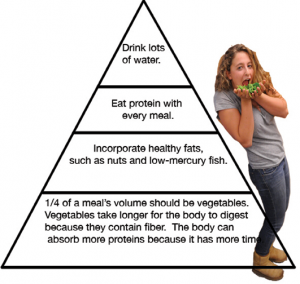Every morning I devour two toasted waffles oozing peanut butter and smeared with apricot jam. “The waffle sandwich,” as my dad calls it, has sat on my breakfast plate everyday for the past three years. This year, however, a glass bowl of raw, crisp spinach now sits next to my precious waffle sandwich.
Why a bowl of spinach? Before the beginning of this year, the leafy green vegetable would have seemed like the last thing I would want to eat at 7:45 in the morning. But this year I began working with Dr. Clyde Wilson for my science research project. Wilson teaches nutrition classes at Stanford and San Francisco State University. In addition, he works with athletes, ranging from those at the collegiate level to Olympians, to help them change their diet in order to enhance their performance on the playing field.
My youth national team water polo training weekend at the end of November influenced me to change to my diet. I decided to embrace some of Wilson’s basic theories, mainly regarding vegetables, proteins and fats- which brings me to my bowl of spinach.

I began with writing down everything I ate. The simple awareness of knowing what I put into my body allowed me to see what my diet was lacking, and what I needed to eliminate. I added more protein to my diet and replaced unhealthy snacks like cookies with almonds or celery with peanut butter. Each day at lunch I pulled out my bag of spinach, munching on veggies alongside a tupperware container full of tortellini.
My initial goal was to feel healthier and increase my swim speed in time for training camp the weekend of November 26. I swam a 200-yard freestyle for time to use as a control for my food experiment. After three weeks of living an enlightened life full of vegetables, I swam the 200 and went two seconds faster. I felt stronger in the pool, better after practice, and overall more energetic as I went through the motions of a normal day.
When I showed up at training, my first snack purchase was a bag of spinach alongside an assortment of trail mix and protein bars. My teammates gave me quizzical looks as they reached for baguettes, chips, and other typical snack foods. Their confused stares turned to interest as I explained to them the madness behind the big bag of “appealing” spinach, and they thrust their chlorinated hands into the sea of spinach leaves.
The changes I made are simple, yet had profound effects. I felt stronger, quicker and fresher in the pool. There is no one way to become healthier, but taking the small steps to a healthier diet will improve how you feel in the pool or on the field.
In sports, you can’t control what play the other team will execute or the weather conditions. But you can control how you feel. Changing my diet allowed me to control another variable of my game and was just another small step to help me become a better athlete.



